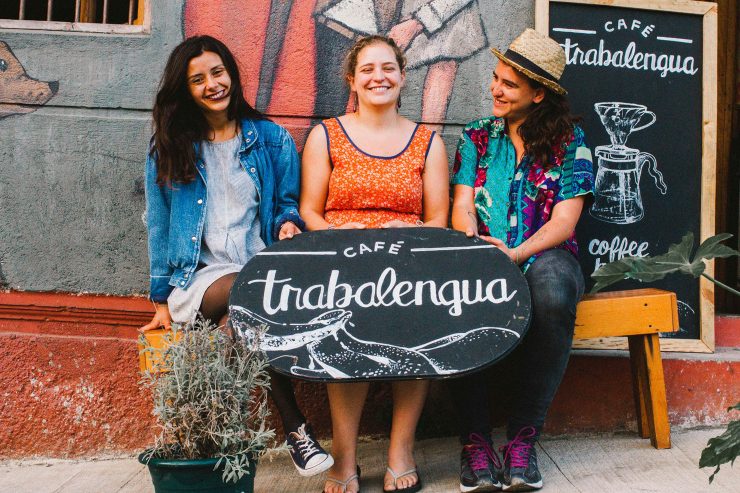Café Trabalengua, named after the Spanish word for tongue-twister, is located in Valparaiso, Chile. Eschewing the usual barista/manager/owner hierarchy, the cafe is run by a collective of friends. They are a dedicated team, giving their community a place to slow down and kick up its heels. Opened last November, the cafe has already established itself as a local workspace, affectionately nicknamed “el Laboratorio” by its patrons.
Opening a craft coffee shop in Chile is difficult. The water can be notoriously imbalanced—it’s drinkable, but not always tasty, due to an intense purification process to counteract pollution. Fortunately, these issues are moot at Trabalengua, where you watch the hustle and bustle from afar. Camila Fuenzalida, Estefanía Diaz, Francisca Rioseco, and the rest of the crew concentrate on pour-overs, French press, and moka pot coffee using portable, filtered water. “We are interested in this insistence on a delay. There is a bystander, linked and committed to the act of making a coffee,” Fuenzalida said on behalf of the group.
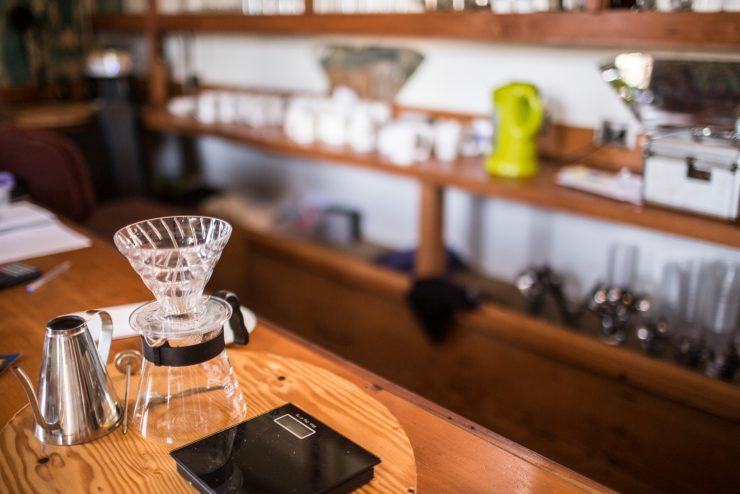
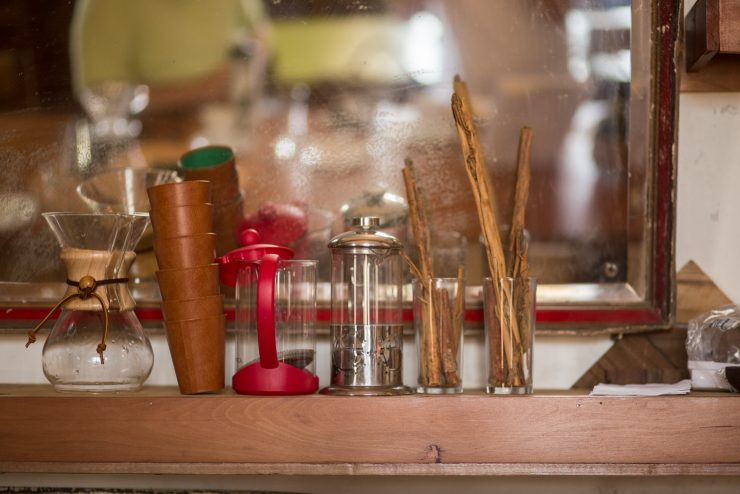
As my companion and I found our seats at a table, we were given paper, pencils, and plenty of attention. This is a space that is designed to cultivate creativity and human connection. In-house artists showcase their work on dedicated shelving next to the bar. Japanese lessons are taught in a well-lit nook. A photographer has his portfolio on display at the counter. Art, conversation, and a sense of inclusion are emphasized here. It wasn’t long before we were invited to play games and have deep conversations about culture over coffee and wine with the baristas.
Trabalengua serves coffees of Nicaraguan and Brazilian origin sourced through Taller Café, passionate specialists in coffee from nearby Viña del Mar. Additionally, Trabalengua utilizes Taller’s expertise for training and equipment to ensure quality coffee. “We try to create closeness with those who come, as if experiencing something from home at our coffeehouse. Suddenly, people see the coffee brewed in a Chemex and say, ‘This is like my grandmother did’,” Fuenzalida explains. All of this is further evidenced by the handpicked fare from an array of local, fresh pastry vendors. Dinners are homemade dishes from familial recipes and are frequently served with Chilean wines. If you’re lucky, as we were, you may even come across some Chilean cakes, available on a whim, baked by the baristas’ mothers.
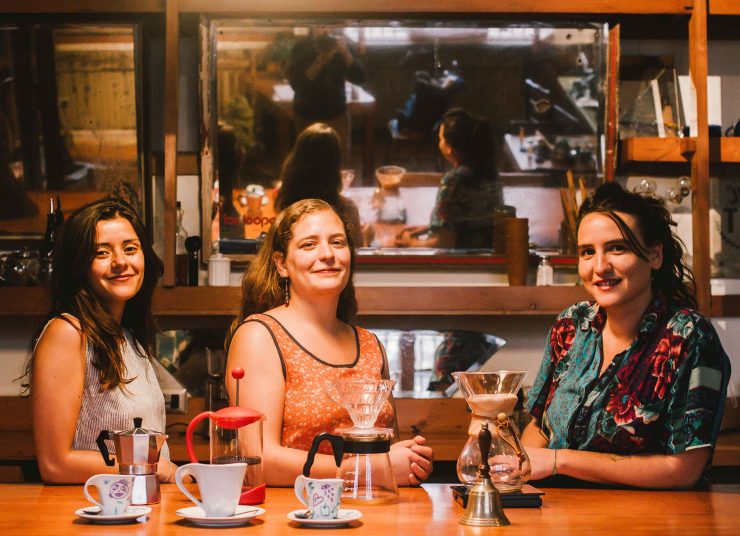
The evocation of family doesn’t end with the food. The friends who run Trabalengua make anyone who saunters through their doors feel as though they’ve always been a part of their household. On our second day there, while at their coffee bar, a football riot broke out down the road. Jersey-clad groups were soon stampeding up and down the hillsides shouting and looking for trouble, and police on motorcycles soon followed. Even Trabalengua’s wooden sign was used as a blunt object. Our hosts reacted quickly—locking the doors, shuttering the windows, and providing a safe haven for everyone inside. They even offered to provide company on our walks home.
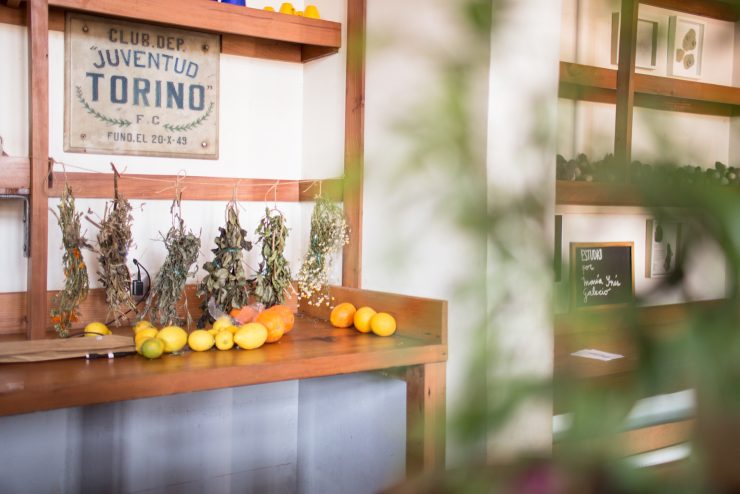
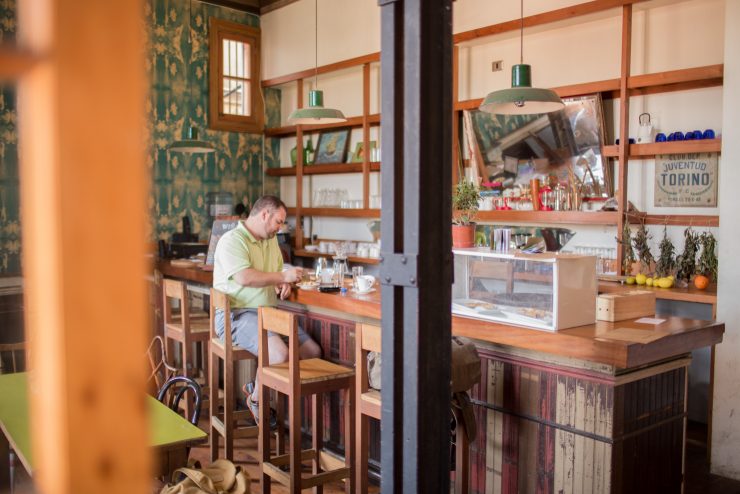
The Trabalengua collective describes its ideals in several ways, but the phrase “una revolución lenta,” a slow revolution, was most evocative to me. The space itself has a colorful, Old World feeling to it. Yet when you look at the details, you’ll notice the modern, hypnotic design of the wallpaper, warm exposed wood tones, and the cleverly designed shelves and braces. The tables, chairs, and sofas are sturdy and comfortable; some were even designed and built by Diaz. It’s located partway up a large hill off the coast with incredible views from the front door. Being located in a UNESCO World Heritage City brings an array of bureaucratic issues to be resolved, but make no mistake—the intention here is to draw you away from the issues of “el mundo de la gente grande”.
Valparaiso is a port city, known for its architecture, hillside funiculars, graffitied walls, and rough demeanor. Café Trabalengua provides a harbor for “artists and non-artists, researchers and non-researchers, scientists and non-scientists, consumers and non-consumers”, says Fuenzalida and a calm amongst a vibrant city. In their own words, “We have almost no customers, only enjoyers, as we like to call them, of different ages, children and grandparents, from all over the world,” Rioseco said, warmly. Personally, I can’t wait to go back, kick off my shoes and relax.
Café Trabalengua is located at Artillería 67, Valparaiso, Chile. Follow them on Facebook.
Adam Arcus (@aarcusphoto) is a journalist and photographer based in Chicago. Read more Adam Arcus on Sprudge.
With additional photographs by Rodolfo Munoz.
The post Cafe Trabalengua, A New Coffee Collective In Valparaiso, Chile appeared first on Sprudge.


